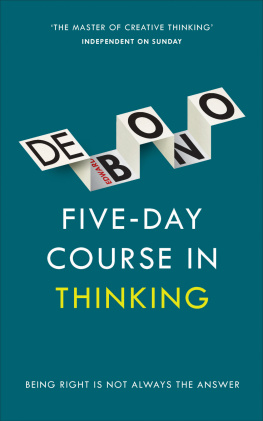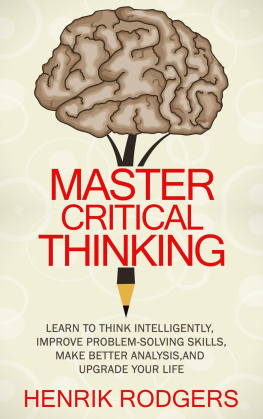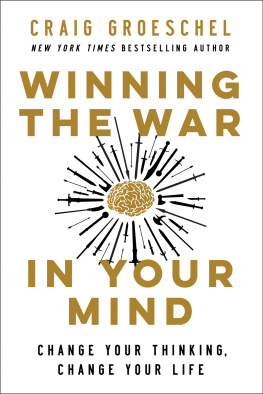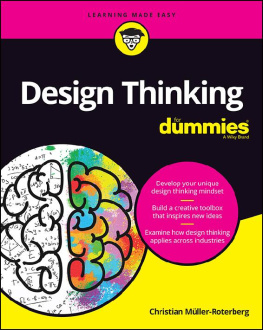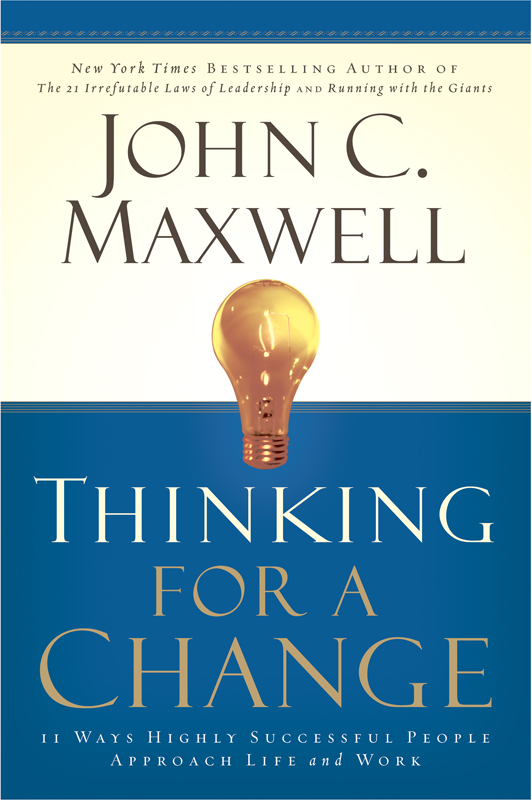Copyright 2003 by John C. Maxwell
All rights reserved.
Scriptures noted NIV are taken from the HOLY BIBLE: NEW INTERNATIONAL VERSION. Copyright 1973, 1978, 1984, by International Bible Society. Used by permission of Zondervan Publishing House. All rights reserved.
Scriptures noted NRSV are taken from the NEW REVISED STANDARD VERSION of the Bible. Copyright 1989 by the Division of Christian Education of the National Council of The Churches of Christ in the U.S.A. All rights reserved.
The author is represented by Yates & Yates, LLP, Literary Agency, Orange, California.
Hachette Book Group, 237 Park Avenue, New York, NY 10017.
Visit our website at www.HachetteBookGroup.com
ISBN: 978-0-7595-2791-1
First eBook Edition: April 2003
This book is dedicated to
All the good thinkers who have shared their thinking
with me over the years.
Thank you for your investment in me.
Id like to say thank you to
Margaret Maxwell, who shares her thinking with me daily
Charlie Wetzel, who does my writing
Kathie Wheat, who does my research
Stephanie Wetzel, who proofs and edits each chapter
Linda Eggers, who runs my life
and the people who shared their ideas for this book:
Dick Biggs
Kevin Donaldson
Tim Elmore
John Hull
Gabe Lyons
Larry Maxwell
Kevin Myers
Dan Reiland
Kevin Small
J. L. Smith
Dave Sutherland
Rolf Zettersten
FORETHOUGHT:
THE DIFFERENCE THAT REALLY MAKES A DIFFERENCE
Why are some people successful and others not? That question has been asked millions of times. Youll hear many answers. Consider some of the popular ones:
- Successful people get better opportunities.
- People who do not succeed have bad backgrounds.
- Education makes all the difference.
- Failure results from bad breaks.
- Some people are smart; others arent.
- Lazy people dont succeed.
Ive looked for answers to that question throughout my life. Let me tell you a story that I believe reveals the solution.
A friend of mine has two daughters. Kim, the 21-year-old younger daughter, applied to pharmacy school during her senior year of college. On the day she got word of her acceptance, her older sister, Jennie, who is 25, was there to share the news. Kim was ecstatic. Jennie felt glad that Kim had achieved her goal, but she also pitied her.
Mom, she said, I feel sorry for Kim. She is going to have to go to school for four more years!
One daughter thinks: I have just earned an opportunity for a future career. Her sister thinks: She has to go to school for four more years!
Heres the difference:
Successful people think differently than unsuccessful people.
One sister heard the news and felt excited because she thought about the lucrative, rewarding career about to open up to her. The other sister thought only about the amount of time it would take to achieve it.
How skilled is your thinking? Does your thinking help you achieve? This book identifies eleven types of thinking that successful people employ. Which type of thinking do you believe will increase your odds for success?
Small Thinking or Big-Picture Thinking?
Scattered Thinking or Focused Thinking?
Restrictive Thinking or Creative Thinking?
Fantasy Thinking or Realistic Thinking?
Random Thinking or Strategic Thinking?
Limited Thinking or Possibility Thinking?
Impulsive Thinking or Reflective Thinking?
Popular Thinking or Innovative Thinking?
Solo Thinking or Shared Thinking?
Selfish Thinking or Unselfish Thinking?
Wishful Thinking or Bottom-Line Thinking?
If youre currently not successful, or you are not as successful as you would like to be, it may be because you are not thinking your way to the top. To place yourself on the pathway of success, I suggest that you do the following:
- Read each chapter to better understand successful thinking.
- Evaluate yourself at the end of each chapter by answering the thinking question.
- Take the action steps included to implement the kind of successful thinking described in the chapter.
Together for the next fourteen chapters, we will take a thinking trip. It could be the difference that makes all the difference in your life!
1. Everything begins with a thought.
Life consists of what a man is thinking about all day.
RALPH WALDO EMERSON
2. What we think determines who we are. Who we are determines what we do.
The actions of men are the best interpreters of their thoughts.
JOHN LOCKE
3. Our thoughts determine our destiny. Our destiny determines our legacy.
You are today where your thoughts have brought you. You will be tomorrow where your thoughts take you.
JAMES ALLEN
4. People who go to the top think differently than others.
Nothing limits achievement like small thinking; Nothing expands possibilities like unleashed thinking.
WILLIAM ARTHUR WARD
5. We can change the way we think.
Whatever things are true noble just pure lovely are of good report, if there is any virtue and if there is anything praiseworthy; think on these things.
PAUL THE APOSTLE
CHANGE YOUR THINKING
AND CHANGE YOUR LIFE
Nurture great thoughts, for you will never
go higher than your thoughts.
BENJAMIN DISRAELI
What Were They Thinking?
Things are more like they are now than they ever were before.
DWIGHT D. EISENHOWER,
thirty-fourth president of the United States
What one thing do all successful people have in common? What one thing separates those who go to the top from those who never seem to get there? The answer: Good Thinking! Those who embrace good thinking as a lifestyle understand the relationship between their level of thinking and their level of progress. They also realize that to change their lives, they must change their thinking.
A DIFFERENT WAY TO THINK
Ive been a student of good thinking all my life, so I know how important it is for making progress. In the first book I wrote back in 1979, titled Think on These Things, I said, Your life today is a result of your thinking yesterday. Your life tomorrow will be determined by what you think today. The title of that book was inspired by the words of the Apostle Paul, who admonished us,
Whatever is true, whatever is honorable, whatever is just, whatever is pure, whatever is pleasing, whatever is commendable, if there is any excellence and if there is anything worthy of praise, think about these things.
My father, Melvin Maxwell, often quoted those words to me. He felt they were important. Why? Because he is an example of someone who changed his life as a result of changing his thinking.
If you met my dad, he would tell you that he was born with a naturally negative bent to his thinking. In addition, he grew up during the Depression, and when he was six years old, his mother died. He was not a happy or hopeful child. But as a teenager, he began to see that all the successful people he knew had one thing in common: they filled their lives with positive thoughts about themselves and others. He desired to be successful like them, so he embarked on the daily task of changing his thinking. To his delight, after much time and effort, his thinking changed him.
People who know him today see Dad as a totally positive person. They would be surprised to find out that he started his life with a negative mind-set. This change in his thinking allowed him to rise to a level of living that seemed above his potential. He went on to be the most successful person in his professional circle. He became a college president and touched the lives of innumerable people. To this day he is my hero.



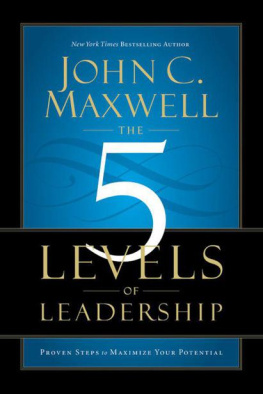

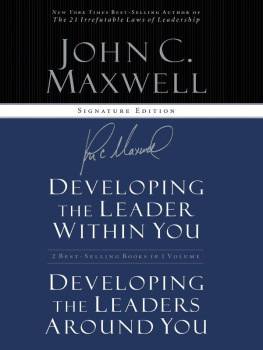
![Maxwell - The 360 [-degree] leader: developing your influence from anywhere in the organization](/uploads/posts/book/218782/thumbs/maxwell-the-360-degree-leader-developing-your.jpg)

